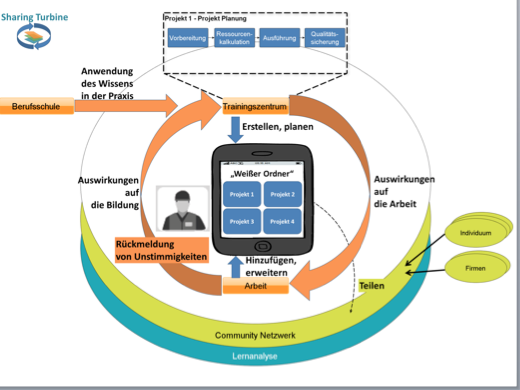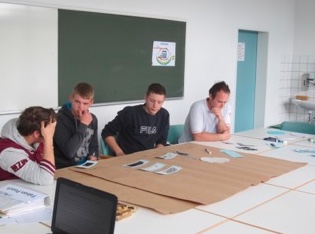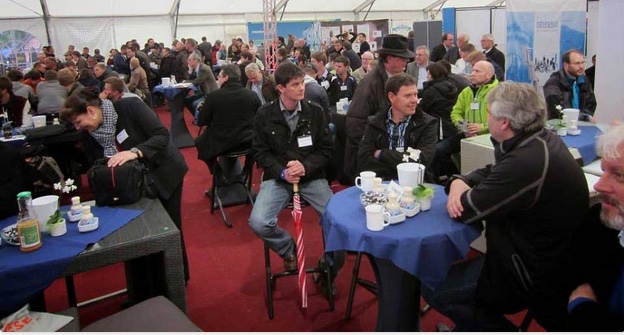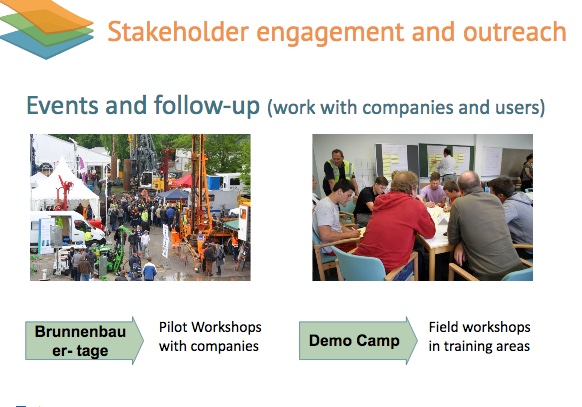Accompanying Research and Participative Design in the Pilot Activities with the Learning Toolbox (LTB)
Highlights
This document presents a picture of the collaboration of researchers, technical partners and application partners in the construction pilot of the Learning Layers as a multi-channelled research & development (R&D) dialogue with an emphasis on the following points:
-
The co-design activities started as a relatively open search for solutions to match the user-initiated design idea (digitisation of learning contents and reporting processes).
-
Research partners were engaged as accompanying researchers with co-shaping roles to support application partners in a complex iterative process, during which the initial design idea was transformed into shaping of Learning Toolbox as an integrative toolset.
-
The R&D dialogue was maintained with several parallel activities - joint work process analyses, shared training events, co-design workshops and joint outreach activities. In this way the process could overcome periods of rupture and uncertainty.
-
The research interventions consisted of empirical studies and conceptual inputs that gave insights into vocational learning and learning in organisational contexts as contexts in which the Learning Toolbox promoted digital transformation.
Background
The methodological background of accompanying research (Begleitforschung) is provided by institutionalised implementation and evaluation research that was introduced in German pilot projects in vocational education and training (Modellversuchsforschung) in the 1970s and in innovation programmes on Work and Technology (AuT-Forschung) in the 1980s. In the early phases research-based accompaniment was introduced as conventional evaluation research but gradually it was developed as action research or intervention research. Institut Technik & Bildung (ITB) had been involved in both types of innovation programmes as a coordination unit and as contributor to accompanying research projects.
As a contrast to the previous cases, the ITB team had to adopted its approach to a more open innovation process that did not have similar overarching frameworks as the earlier AuT-studies or pedagogic pilot hypotheses as the Modellversuche. Therefore, the role of accompanying research had to be adjusted to research & development (R&D) dialogue within a more open co-design process. The process has the task to shape solutions for introducing digital media, web resources and use of mobile devices in construction work and in related vocational education and training (VET).
R&D dialogue and processes of participative design
It is essential to emphasise that the co-design process started as an open and explorative exercise that gradually took the course towards an integrative toolset that was developed as the final product - the Learning Toolbox (LTB). During the process researchers, practitioners and technical partners worked on the basis of the following design principles that have guided the process from the initial start to the final product:
-
The product and its implementation have to be relevant for vocational and workplace-based learning contexts in construction sector.
-
The product and its implementation have to support self-organised and action-oriented learning of apprentices and skilled workers.
-
The product has to facilitate social shaping (Gestaltung) of work and technology and workers’ participation in design processes.
-
Active interactivity and mutual responsiveness in the design process.
-
Enabling real-time knowledge sharing between different parties in the actual use of tools, apps and resources.
The co-design process can be characterised as series of preparatory measures, iterations, training interventions and outreach actions that contributed to the decisive phases of software development and to the pilot testing with the Learning Toolbox. Below this multi-channelled process is described briefly as successive phases (in the next section the phases and linked activities are described in greater detail).
-
During the preparatory measures the ITB team carried out stakeholder interviews, drafted user stories, launched user surveys in Bau-ABC and organised conversational and storyboarding workshops to support the co-design process.
-
During the iterative processes the initial design idea was discussed with trainers and the scope of design work was narrowed down to selected pilot areas, whilst other ideas and impulses were listed for further measures. Gradually this led to the transformation of the initial design idea. The process started as digitisation of training and learning resources. It shifted into shaping of a flexible and integrative toolset that provides access to web tools and online resources and supports real-time knowledge sharing via mobile devices.
-
In an interim phase the partners involved organised joint outreach activities with mock-up versions of the Learning Toolbox that was demonstrated to different potential users in the construction sector, and in particular the demonstration campaign at the Brunnenbauertage fair, the Demo Camp workshop during the project consortium meeting, the production of LTB-related videos at training areas of Bau-ABC 2014 .
-
Parallel to these activities the partners carried out two major training interventions: the voluntary Multimedia Training for interested trainers (2013 -2014) and the Theme Room Training campaign (2015) for the entire training staff of Bau-ABC (see the Impact card and the Methodology document).
-
The final phase of the process has been the user-driven deployment of Learning Toolbox in the training activities of Bau-ABC in the selected pioneering trades (see the Impact Card and the Learning Scenario).
Interventions, contributions and interactions during the process
During the above described process of R&D dialogue the role of accompanying research varied. The main actions of research teams (in the context of dialogue) will be summarised below as empirical research interventions, theoretical or conceptual contributions and other interactive support measures.
a) Empirical research interventions
In the beginning phase the aim of the stakeholder interviews (with Bau-ABC trainers and with representatives of their partner companies) to map their working contexts, prior experiences with digital tools. Furthermore, the counterparts reported on problems and special interests to be taken into account in the co-design work. In the same way the ‘co-design workshops’ with Bau-ABC apprentices and trainers revealed several problems and interests regarding the potential and use of digital tools. In particular the storyboard workshops drew attention to several trade-specific communication gaps and risk situations that could be considered as points of intervention in the co-design process. In this phase ITB and Bau-ABC also implemented User surveys among Bau-ABC apprentices to map their awareness of and experiences with digital tools and web resources as support for learning. (On the results see Use of Learning Toolbox by Bau-ABC Trainers and Apprentices.)


Figures 1 and 2: Early findings and first iterations in the co-design process
b) Theoretical and conceptual contributions
In this context it is essential to refer to the ITB contributions to the Theory Camp of the project that have provided conceptual support for the co-design and pilot activities. Secondly, it is worthwhile to refer to the exchanges with other research groups that work with Activity Theory and Change Laboratory methodologies.
The key contributions of ITB team to the Theory Camp focused on the concepts ‘work process knowledge’ and ‘action-oriented learning’ both emerging from prior ITB research.
-
The concept ‘work process knowledge’ (Arbeitsprozesswissen) emerged from German and trans-national projects that analysed success factors in technical and organisational innovations across Europe in the 1990s. The key finding was the necessity to create processes of organisational learning and to promote acquisition of shared knowledge on matching activities, mutually complementing roles and commitments between different occupations involved. This concept is used in Organisational Learning and Cooperation at a Construction Site to interpret an impact case.
-
The concept ‘action-oriented learning’ (Handlungsorientiertes Lernen) referred to early curriculum reforms and pedagogic development in vocational education and training (VET). The main emphasis on acquisition of holistic vocational competences. The concept ‘action-oriented’ refers to command of complete occupational actions and to empowerment of learners in terms of self-organised learning. In this context the role of research has been to support the shaping of working and learning arrangements that promote such learning. This concept is used in Action-Oriented Learning in Apprentice Training to interpret an impact case.
The main activity in the exchanges with other research groups was the joint symposium “Reviewing Activity Theory, Developmental Work Research and Change Laboratory Methodology – Experiences, Critique and Lessons Learned” at the Bremen international conference “Crossing Boundaries in Vocational Education and Training: Innovative Concepts for the 21st Century” in September 2015. These exchanges provided ideas for exploitation activities (potential and limits of Change Laboratory processes) and for secondary analyses of the co-design processes of Learning Layers (the key concepts ‘Boundary object’ and ‘Expansive learning cycle’ of the Activity Theory).
c) Interactive support measures
In this context it is important to highlight the crucial role of the training interventions in Bau-ABC as support for the co-design process and for the deployment of the Learning Toolbox (LTB). A detailed examination of these activities is given in the Impact Card and in the Methodology document.
Also, the joint outreach activities of ITB researchers, technical partners and Bau-ABC staff members were important exchanges with construction sector professionals and apprentices. These activities were carried out with an early demonstration version of the LTB during different events. The most important was the promotion campaign during Brunnenbauertage fair in May 2014 with presentation for large audience and stakeholder talks with tens of company representatives. A more limited promotion campaign was carried out with Bau-ABC trainers at the NordBau fair in September 2014 with stakeholder talks with representatives of six major suppliers of construction vehicles and machinery. In June 2014 team members from ITB, Pontydysgu and Bau-ABC organised jointly a Demo Camp event during the project meeting in Bau-ABC and demonstrated the emerging LTB to 100 apprentices and trainers.


Figures 3 and 4: Outreach activities with Learning Toolbox: Brunnenbauertage and Demo Camp in Bau-ABC Rostrup 2014
During the deployment of LTB accompanying researchers (ITB, TLU) and evaluation researchers (UIBK) were present in Bau-ABC on several occasions. Firstly the role of accompanying researchers was to work as facilitators during the kick-off events and then as tutors for other Bau-ABC trainers to spread the use of LTB to other trades or learning areas.
During the final evaluation visits accompanying researchers from ITB and TLU supported the evaluation sessions led by UIBK and worked together with the interpretation of the findings (see on this the Learning Scenario).
Reflections
In the light of the above it is apparent that the work of accompanying researchers was not a process that would have guided by one single ‘method’ or pre-defined methodology. Neither was it a case of classical action research. As has been indicated earlier, the ITB team built upon earlier experiences with accompanying research in innovation programmes but adapted its approach to a more open co-design process. Also, it is worthwhile to note that the co-design process was not primarily about social shaping of work and (production) technology or about pedagogic development of vocational education and training. The project was based on interventions to introduce digital media and web resources via mobile devices to (informal) learning at workplaces.
From this perspective it is important to understand that the co-design activities in the Construction pilot were not primarily a tool-centred and design-driven process. Instead, in the early phase the accompanying research partners and application partners were supported by technical partners with intermediate role (but not that of software developers). Under these circumstances it was important to generate a multi-channelled R&D dialogue that included work process analyses, co-design sessions and shared learning activities. In this context the partners could agree on a radical transformation of the design idea, which meant a shift from digitisation of learning content to shaping a flexible digital toolset for accessing and sharing learning resources.
In this - essentially transformative - process of R&D dialogue, in which all partners involved have to face new challenges, the role of ITB researchers can be characterised as agile accompanying research. By learning together with application partners, how to work as change agents, ITB participated in the process, documented the process and supported the continuity of the process. In the final phase the peer tutoring by accompanying researchers was crucial for spreading the use of Learning Toolbox among application partners.
For the application partners - in particular for trainers in Bau-ABC - participation in such R&D dialogue has provided a chance for becoming in real terms co-owners of innovations. In the shaping of the Learning Toolbox this has not been merely a matter of receiving the end product that was the originally expected outcome. In this co-design process the trainers have firstly reshaped their own informal learning processes in the context of the training interventions of the project. After the successful piloting with the Learning Toolbox they have the chance to continue as innovation leaders in their own trades and as multipliers of innovation in their wider networks.
Links to other sections
Tools
Impact Cards
Use of Learning Toolbox by Bau-ABC Trainers and Apprentices
Multimedia Training for and with Bau-ABC Trainers
Learning Scenarios
Organisational Learning and Cooperation at a Construction Site
Action-Oriented Learning in Apprentice Training
Research Methodologies
Training Interventions as Capacity-Building for Digital Transformation
Further Reading
Research articles and papers
Conference paper (ECER 2014) The Role of Accompanying Research and Participative Design in the Learning Layers Project - 2014. ResearchGate DOI: 10.13140/RG.2.2.29877.06881
Conference paper (ECER 2014) and article Interactive Research on Innovations in Vocational Education and Training (VET): Lessons from Dutch and German cases. ResearchGate DOI: 10.13152/IJRVET.1.2.4
International Journal for Research in Vocational Education and Training 1(2):143-160 · December 2014
Learning Layers Theory Camp (2014) papers
WP Accompanying Research: Reviewing the role of Accompanying Research, Interactive Research and Action research as support for participative design processes. ResearchGate DOI: 10.13140/RG.2.2.22003.32806
WP1/ Work Process Knowledge: Introduction to the reviewing of the legacy of the EU-funded Work Process Knowledge network (FP4 - TSER). ResearchGate DOI: 10.13140/RG.2.2.34795.95527
WP2/ Work Process Knowledge: Revisiting the Theme ‘Work Process Knowledge’ and its implications for vocational education and training - The position the WPK network. ResearchGate DOI: 10.13140/RG.2.2.30391.93602
WP3/ Work Process Knowledge: Reviewing Work process knowledge - Summary. ResearchGate DOI: 10.13140/RG.2.2.23371.39206
WP1/ Vocational and Workplace Learning: Conceptual interpretations of ‘Work Experience’, Vocational professionalism’ and ‘Workplace Learning’ - Overview on selected European studies. ResearchGate DOI: 10.13140/RG.2.2.22894.61761
WP2/ Vocational and Workplace Learning: Approaching a Synthesis: - Workplace Learning, Vocational Knowledge Processes, Working and Learning Tasks.. ResearchGate DOI: 10.13140/RG.2.2.30863.79523
WP3/ Vocational and Workplace Learning: Reviewing Vocational and Workplace-based learning - Summary. ResearchGate DOI: 10.13140/RG.2.2.26805.47842
Articles on Learning Layers website, Construction section
Article 2/2014: Co-design process from “Sharing Turbine” to “Learning Toolbox”
Article 3/2014: Learning Layers project goes to Brunnenbauertage with the “Learning Toolbox
Article 4/2014: The Demo Camp presents the Learning Layers tools to apprentices and trainers
Article 1/2016: Insights into “Theme Room” training campaign in Bau-ABC
Article 2/2016: Peer learning and use of digital media in Theme Room workshops
Logbooks of blogs on the development of the Learning Toolbox
Logbook of LTB-Blogs 2014 on the development of the Learning Toolbox (LTB) on “Working and Learning” blog. ResearchGate DOI: 10.13140/RG.2.2.24583.80808
Logbook of LTB-Blogs 2015 on the development of the Learning Toolbox (LTB) on “Working and Learning” blog. ResearchGate DOI: 10.13140/RG.2.2.31294.69444
Logbook of LTB-Blogs 2016a on the development of the Learning Toolbox (LTB) on “Working and Learning” blog. ResearchGate DOI: 10.13140/RG.2.2.12839.75687
Logbook of LTB-Blogs 2016b on the development of the Learning Toolbox (LTB) on “Working and Learning” blog. ResearchGate DOI: 10.13140/RG.2.2.32972.41602
Literature
Management regionaler Innovationsnetzwerke. Evaluation als Ansatz zur Effizienzsteigerung regionaler Innovationsprozesse, (missing reference)
Neue Lernkonzepte in der dualen Berufsausbildung. Bilanz eines Modellversuchsprogramms der Bund-Länder-Kommission (BLK), [1]
European perspectives on learning at work: the acquisition of work process knowledge, [2]
Fischer, M. & Boreham, N. 2008: Work Process Knowledge. In Rauner, F. & Maclean, R. (Eds.) 2008: Handbook of Technical and Vocational Education and Training Research. International Library of Technical and Vocational Education and Training. Springer Verlag.
Learning and working tasks as elements of work-related vocational education and training. [3]
Contributing Authors
Pekka Kämäräinen, Ludger Deitmer, Werner Müller, Lars Heinemann, Joanna Burchert, Graham Attwell, Gilbert Peffer, Melanie Campbell
References
- L. Deitmer, M. Fischer, and P. Gerds, Neue Lernkonzepte in der dualen Berufsausbildung: Bilanz eines Modellversuchsprogramms der Bund-Länder-Kommission (BLK). Bielefeld: Bertelsmann, 2004 [Online]. Available at: http://katalog.suub.uni-bremen.de/DB=1/LNG=DU/CMD?ACT=SRCHA&IKT=8000&TRM=65835472*
- M. Fischer, N. C. Boreham, and B. Nyhan, European perspectives on learning at work: the acquisition of work process knowledge. Office for Official Publications of the European Communities, 2004.
- F. Howe, “Learning and working tasks as elements of work-related vocational education and training,” European perspectives on learning at work: the acquisition of work process knowledge / Martin Fischer ... (eds.), pp. 304–322, 2004 [Online]. Available at: http://katalog.suub.uni-bremen.de/DB=1/LNG=DU/CMD?ACT=SRCHA&IKT=8000&TRM=72266699*
